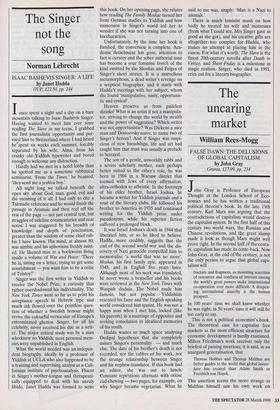The Singer not the song
Norman Lebrecht
ISAAC BASHEVIS SINGER: A LIFE by Janet Hadda OUP, £22.50, pp. 244 Ionce spent a night and a day on a bare mountain talking to Isaac Bashevis Singer. Having wanted to meet him ever since reading The Slave in my teens, I grabbed the first journalistic opportunity and pur- sued him to Switzerland where I had heard he spent six weeks each summer, forcibly separated by his wife, Alma, from his cranky old Yiddish typewriter and bored enough to welcome any distraction.
Hardly had we met in a hotel lobby than he spotted me as a sometime rabbinical seminarist. 'From the Times,' he beamed, `they send me a yeshiva boy.' All night long we talked beneath the open sky, about God, man, good, evil and the meaning of it all. I had only to cite a Talmudic reference and he would finish the passage in Aramaic and then reel off the rest of the page — not just central text, but straggles of sideline commentaries and rear notes. I was staggered by his breadth of knowledge and depth of penetration, greater than the wisdom of some chief rab- bis I have known. His mind, at almost 80, was nimble and his aphorisms freshly mint- ed. He likened man to a bookworm living inside a volume of War and Peace: 'There he is, sitting on a letter, trying to get some nourishment — you want him to be a critic of Tolstoy?'
Singer was the first writer in Yiddish to receive the Nobel Prize, a curiosity that rather overshadowed his individuality. The New York Times went so far as to print his acceptance speech in Hebrew type and much ink flowed over the pointless ques- tion of whether a Swedish honour might revive the colourful vernacular of Europe's exterminated ghettos. Singer, for all his celebrity, never received his due as a writ- er. The major critical study was by a man who knew no Yiddish; most personal mem- oirs were unpublished in English.
What the world needed was an indepen- dent biography, ideally by a professor of Yiddish at UCLA who also happened to be a training and supervising analyst at a Cali- fornian institute of psychoanalysis. Fluent in Singer's mother-tongue and therapeuti- cally equipped to deal with his unruly libido, Janet Hadda was formed to write this book. On her opening page, she relates how reading The Family Moskat turned her from German studies to Yiddish and how immersion in Singer's world led her to wonder if she was not turning into one of his characters.
Unfortunately, by the time her book is finished, the conversion is complete. Aca- demic detachment has gone, attention to fact is cursory and the sober authorial tone has become a sour feminine kvetch of the kind emitted by the Shoshas and Feiges of Singer's short stories. It is a marvellous metamorphosis, a dead writer's revenge on a sceptical biographer, and it starts with Hadda's meetings with her subject, whom she found 'manipulative, nasty, opportunis- tic and cynical'.
Heaven preserve us from guileless shrinks! What is an artist if not a manipula- tor, striving to change the world by stealth and the power of suggestion? Which writer was not opportunistic? Was Dickens a nice man and Dostoevsky naive, to name two of Singer's heroes? And if Singer was suspi- cious of new friendships, life and art had taught him that trust was usually a prelude to betrayal.
The son of a gentle, unworldly rabbi and a severe scholarly mother, each perhaps better suited to the other's role, he was born in 1904 in a Warsaw district that teemed with Jews of every affirmation, ultra-orthodox to atheistic. In the footsteps of his elder brother, Israel Joshua, he became a writer for Yiddish journals and a roué of the literary clubs. He followed his brother to America in 1935 and continued writing for the Yiddish press under pseudonyms, while his superior fiction suffered a prolonged block.
It was Israel Joshua's death in 1944 that liberated him, or so he liked to believe. Hadda, more credibly, suggests that the end of the second world war and the dis- covery of Nazi genocide compelled him to memorialise 'a world that was no more'. Moskat, his first family epic, appeared in 1945, and in English five years later. Although most of his work was translated, he never wrote a bestseller and his books were reviewed in the New York Times with Waspish disdain. The Nobel made him famous, but not popular. Yiddishists resented his fame and the English-speaking world considered him quaint. He was not a happy man when I met him, locked (like his parents) in a marriage of opposites and seeking consolation in idealised memories of his youth.
Hadda wastes so much space analysing Oedipal hypotheses that she completely misses Singer's personality — and much else. The date of his brother's death is not recorded, nor the calibre of his work, nor the strange relationship between Singer and his nephew-translator. If this book had an editor, she was out to lunch. Constant repetitions alternate with otiose cud-chewing — two pages, for example, on why Singer became vegetarian. What he said to me was, simply: 'Man is a Nazi to animals.'
There is much feminist mush on how badly he treated his wife and mistresses (from what I could see, Mrs Singer gave as good as she got), and his creative gifts are altogether too complex for Hadda, who makes no attempt at placing him in the canon. For what it's worth, The Slave is the finest 20th-century novella after Death in Venice, and Short Friday is a milestone in magic realism. Singer, who died in 1991, cries out for a literary biographer.






















































 Previous page
Previous page